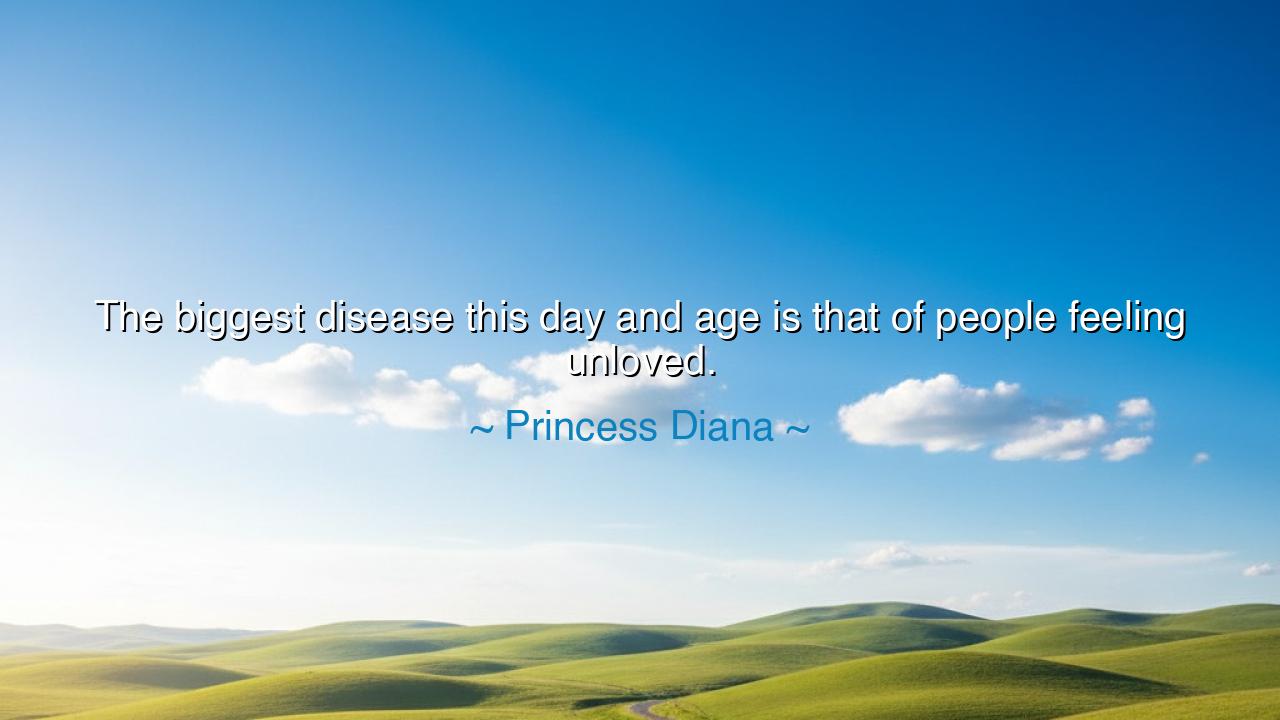
The biggest disease this day and age is that of people feeling






In the quiet recesses of the heart, where the deepest wounds are often hidden from the world, there lies a suffering that transcends physical ailment. It is not a disease of the body, but of the spirit—a malady that affects the very core of our existence. Princess Diana, a woman whose life was lived under the scrutinizing gaze of the world, once spoke a truth that resonates deeply across time: “The biggest disease this day and age is that of people feeling unloved.” These words, simple yet profound, touch upon the loneliness that has gripped the human soul, especially in a world increasingly divided by technology, materialism, and the relentless pursuit of success. For to be unloved is not merely to lack affection, but to be denied the very essence of what it means to be human.
To feel unloved is to feel disconnected from the world itself, to be adrift in a sea of faces that pass by without recognition, without acknowledgment of one's worth. It is a silent suffering, one that does not always show itself in the ways we expect. A person who feels unloved may smile in the presence of others, may carry the appearance of being whole, but within, there is an aching void. In the depths of that silence, the soul begins to wither, like a flower that has been deprived of the light it needs to bloom. It is a disease not of the body, but of the spirit, a wound that cannot be seen but is felt in every moment of isolation and despair.
The ancients understood the power of love in a way that transcended the simple emotions of affection or desire. In the time of Plato, the philosophers spoke of love as the very force that gave life meaning. In his work Symposium, Plato discussed love as a divine pursuit, one that transcends the physical realm and connects the lover to the eternal truths of the soul. To be loved was not just to experience affection, but to be recognized as a whole being, to be seen and valued in a world that often overlooks the individual. In the same vein, Princess Diana recognized that to feel unloved was not merely an emotional state, but a spiritual wound that could leave a person feeling invisible, disconnected from the very fabric of humanity.
Consider the story of Vincent van Gogh, a man whose art continues to touch the hearts of millions, but who, in his own life, suffered greatly from feelings of isolation and unlove. Van Gogh’s work, filled with emotion and passion, was a reflection of his deep need for connection. Yet, in his own time, his art was largely unappreciated, and his relationships were strained by his intense nature and internal turmoil. Van Gogh's loneliness—his sense of being unloved—was the very thing that drove him to create, but it was also the thing that nearly destroyed him. His feelings of being unnoticed, unloved, and misunderstood led him into a profound darkness that ultimately claimed his life. Van Gogh’s story is a tragic reminder of how the disease of feeling unloved can manifest not only as emotional pain, but as a source of destruction.
What Princess Diana understood so deeply was that love is the healing balm for this wound. To be loved is not simply to receive affection, but to be seen, to be acknowledged, to be accepted fully for who we are. In her own life, Diana became a symbol of compassion, reaching out to those in need, not just with charity, but with genuine love and empathy. She embraced those who were often ignored by society—the sick, the marginalized, the forgotten—and through her actions, she showed the world that love has the power to heal, to restore, and to make whole what was broken. Diana’s legacy is one of unconditional love, a reminder that it is not enough to simply exist in the world; we must make others feel seen, heard, and valued.
The lesson from Diana’s words is not one of pity, but of action. It is a call to each of us to recognize the importance of love in our lives—not just romantic love, but the love that is given freely to all, the love that transcends barriers and heals wounds. To alleviate the disease of feeling unloved, we must first recognize that it is a collective responsibility. We must look around us and reach out to those who feel unseen, who walk through the world with invisible burdens. It is in our power to offer kindness, to listen deeply, and to acknowledge the inherent worth of others. In this, we can heal not only ourselves, but the world.
Let us then take this wisdom into our lives, for the disease of feeling unloved is a malady that we can, in part, cure with compassion and connection. Reach out to those who are isolated, offer your presence to those who are struggling, and remind those around you of their value. In doing so, we not only combat the disease of unlove, but we become vessels of healing, spreading light where there is darkness and filling the world with the very thing it needs most: love.






AAdministratorAdministrator
Welcome, honored guests. Please leave a comment, we will respond soon